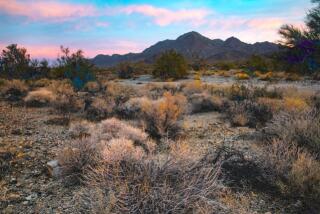Chumash Battle to Protect Their Heritage, Buried Ancestors in Malibu
- Share via
Long before Johnny Carson, before Sylvester Stallone, before Cher, Malibu was home to the Chumash Indians.
It was the southern capital of a Chumash territory that stretched 200 miles north, a coastal paradise of rugged canyons, enchanting cliff sides, golden beach and blue-green Pacific. They called it Hue-mali-wuu--”roar of the crashing waves.”
The paradise remains, but Chumashes’ Malibu is gone--obliterated by 18th-Century Spanish missionaries who sought to convert the natives to Christianity. What remains of that society is concealed below the soil.
The surviving Chumash want it to stay that way. They have become champions of their own heritage, battling modern-day bulldozers that dig up Chumash artifacts and bodies from sacred burial sites in the name of ocean-view progress.
“In any culture, there’s dignity and a respect that the dead deserve to rest in the breast of Mother Nature, to sleep in peace,” said Kyle Lotah, 47.
Last year, the remains of six Chumash were unearthed at a construction site along gated Sea Level Drive, within a Frisbee toss of homes owned by Mel Gibson, Emilio Estevez and other Hollywood notables.
Lotah and the state Native American Indian Commission went to court to fight the project, alleging that developer Moses Lerner had desecrated the remains.
But a judge denied a temporary restraining order to stop construction, citing lack of evidence, and workers continued to build three luxury homes on the site.
Attorney Alan Block, who represents Lerner, says the bodies were reburied.
“The law says if you find burial remains, you contact the coroner and rebury on another site on the property in accordance with Chumash tradition, which we did,” Block said. “As far as we’re concerned, we didn’t do anything wrong.”
Lotah strongly disagrees, alleging the bodies were reburied in cardboard boxes and plastic bags -- a far cry from the elaborate ceremony in which the Chumash buried their dead with their possessions in a prone position toward the west, so spirits could embark on their journey.
“As far as we’re concerned, they’re not at rest,” Lotah said. “They were denied their traditional place in the ground.”
“They’re still reaching out to us, so it’s not over,” says Lotah’s 42-year-old wife, Lin A-lul’koy Lotah.
Developers are obligated by state law to hire a Chumash consultant such as Lotah to survey a site if artifacts or a burial site are found. And with a little help from Hollywood, the Chumash may see stricter, local controls placed on developers.
Actor Edward Albert has launched a cultural resources task force to work with Malibu officials for laws that would foster respect for the native people.
“We’re trying to make sure that laws aren’t set up without consulting the Chumash,” Albert said. “Once the resources are gone, they’re gone for good.”
Lotah and his wife live up the coast from Malibu in Ventura and work with Owl Clan Consultants, established in the early 1970s by a group of Chumash educated in the tribe’s history.
Depending on the location, developers must pay consultants up to $150 a day to scout their site--an obstacle that some developers would rather ignore.
Others see an ulterior motive.
“I do think that there are alleged Native Americans who view this as a way to stop development,” attorney Block said.
Lotah concedes some non-Chumash try to pass themselves off as American Indians in order to get the work. But he says his group is not anti-development.
If a burial site is found, the Chumash negotiate with the developer to build around it, and if the bodies have already been dug up, they try to rebury them as close to the original site as possible, Lotah said.
“The bottom line is we don’t want our ancestors or anything belonging to them taken away,” Lin A-lul’koy Lotah said.
More to Read
Sign up for Essential California
The most important California stories and recommendations in your inbox every morning.
You may occasionally receive promotional content from the Los Angeles Times.










